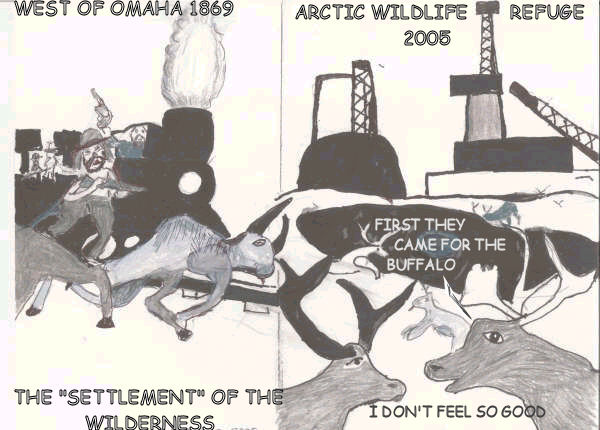From the Open-Publishing Calendar
From the Open-Publishing Newswire
Indybay Feature
Last shot to keep Oil out of ANWR.
A Cartoon about Manifest Destiny from Dirtworshiping Heathens Sketchbook...

Renowned for its wildlife, the Arctic National Wildlife Refuge is inhabited by forty-five species of land and marine mammals. It was established in 1960 as a promise to the American people to preserve "wildlife, wilderness, and recreational values." Vast and remote, this 19.5-million-acre refuge is the size of South Carolina. While 8.9 million acres are designated as wilderness, the 1.5-million-acre coastal plain, the biological heart of the Refuge, does not yet have wilderness designation. Oil drilling has been proposed on the coastal plain.
The Arctic National Wildlife Refuge is a place of wildness, where timeless ecological and evolutionary processes continue in their natural ebb and flow. The mystery of nameless valleys remains alive, where one can experience solitude, self-reliance, exploration, adventure, and challenge. The spirit of wilderness prevails here.
The Gwich'in are the northernmost Indian Nation living in fifteen small villages scattered across vast area extending from northeast Alaska in the U.S. to the northern Yukon and Northwest Territories in Canada. There are about nine thousand Gwich'in people who currently make their home on or near the migratory route of the Porcupine River Caribou Herd in communities in Alaska, Yukon, and the Northwest Territories. The word "Gwich’in" means "people of the land", and it refers to a people who have lived in the Arctic since before the political boundaries that now transect the Gwich’in homelands were drawn on maps dividing Alaska and Canada. Oral tradition indicates that the Gwich'in have occupied this area since time immemorial, or, according to conventional belief, for as long as 20,000 years.
For thousands of years, Gwich’in have relied upon the Porcupine River Caribou Herd to meet their subsistence needs. Each spring they watch first the pregnant cows, and later the bulls and yearlings leave their country in their northern migration to the coastal plain of the Arctic National Wildlife Refuge, the caribou birthing place and nursing grounds. The Gwich'in are caribou people. The birthplace of the Porcupine River Caribou Herd is considered Sacred. The Gwich'in call it "Iizhik Gwats'an Gwandaii Goodlit" (The Sacred Place Where Life Begins). The Porcupine herd is named after its spring and fall crossings of the Porcupine River, during its annual migration. The Porcupine Caribou herd consists of approximately 129,000 animals. Each spring they migrate from their winter range in the boreal forests of the Chandalar, Porcupine and Peel Rivers, north to their spring calving and nursery grounds on the Arctic coast plain of northeastern Alaska and Yukon. Today, as in the days of their ancestors, the caribou is still vital for food, clothing, tools, and are a source of respect and spiritual guidance for the Gwich'in.
The National Academy of Sciences documented major negative impacts from oil development on wildlife, the land, and Native American cultures across extensive areas of the North Slope.
Their study, Cumulative Environmental Effects of Oil and Gas Activities on Alaska’s North Slope (2003), concluded oil development harmed wildlife and habitats in many ways:
· Major cumulative impacts to caribou, grizzly and polar bears, waterfowl and shorebirds, and endangered bowhead whales;
· The Porcupine Caribou Herd is the most vulnerable to human-caused and natural stresses of all the caribou herds in Alaska;
· Natural recovery of tundra is very slow, "it is unlikely that most disturbed habitat on the North Slope will ever be restored."
The National Academy of Sciences also reported health and social impacts from oil and gas development and few jobs for local Alaska Natives:
· "In addition to stress contributing to adverse health effects, oil development has increased the smog and haze near some villages, which residents believe is causing an increase in asthma. The stress of integrating a new way of life with generations of traditional teachings has increased alcoholism, drug abuse, and child abuse. Higher consumption of non-subsistence food…has increased the incidence of diabetes."
· "That few who live in the North Slope Borough are directly employed by the oil and gas industry has been noted for almost two decades… and is supported by findings of both the NSB survey … and the Alaska Department of Labor."
· "In addition, Inupiat at Prudhoe Bay find they are a small minority in a primarily white workforce that can sometimes express hostility toward Alaska Natives. The jobs available to the Inupiat often are seen by them as menial or as token jobs."
"The Gwich’in believe that oil and gas-related activities there [in the coastal plain of the Arctic National Wildlife Refuge] would affect the reproductive potential and migration patterns of the Porcupine Caribou herd and as a result threaten their way of life. As with the Inupiaq concerns about offshore development, the beliefs are intense and widespread and they constitute a continuing effect that is exacerbated by the past and current political debate over development in the Arctic National Wildlife Refuge… The threats accumulate because there have been repeated attempts to develop the area and there is continuing pressure to do so."
Please contact your Representatives and tell them that drilling in the Arctic Refuge must not happen because it threatens the Arctic Refuge. Also please write letters to your local papers and let your voice be heard in other media outlets.
You could call them at the Capitol switchboard: (202) 224-3121.
Or call toll-free with the Arctic Action Hotline: 1-888-8-WILDAK (1-888-894-5325).
Or Do you Beleave in "Manifest Destiny"?...
Please visit http://www.gwichinsteeringcommittee.org
http://home.comcast.net/~shajon/index.html
For more information:
http://home.comcast.net/~shajon/index.html
Add Your Comments
We are 100% volunteer and depend on your participation to sustain our efforts!
Get Involved
If you'd like to help with maintaining or developing the website, contact us.
Publish
Publish your stories and upcoming events on Indybay.
Topics
More
Search Indybay's Archives
Advanced Search
►
▼
IMC Network


